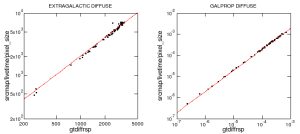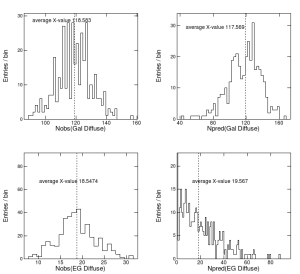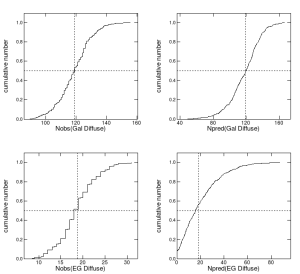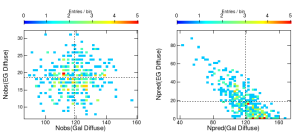Comparison of gtdiffrsp output with gtsrcmaps values
- The diffuse response quantities are proportional, up to an energy-dependent factor
Unknown macro: {latex}(i.e., the spectrum), to the probability densities of a given event for the corresponding source models. If
$s(E)$
Unknown macro: {latex}is the spatial distribution of the diffuse component, then the diffuse response is$\tilde
Unknown macro: {S}(\hat
Unknown macro: {p})$
Unknown macro: {latex}\newcommand
Unknown macro: {phat}{{\hat
Unknown macro: {p}}}
\newcommandUnknown macro: {phatp}{{\hat
^\prime}}
\newcommandUnknown macro: {E}\epsilon
\newcommandUnknown macro: {Ep}\E^\prime
\beginUnknown macro: {eqnarray}d_0(\Ep, \phatp) &= &\int d\phat \tilde
Unknown macro: {S}(\phat) P(\phatp; \E, \phat, t) A(E, \phat, t) D(\Ep; \E, \phat, t)
&= &\int d\phat \tilde(\phat) P(\phatp; \Ep, \phat, t) A(\Ep, \phat, t)
\endHere, $\phat$ and $\E$ are true photon direction and energy, $t$ is the arrival time, primes indicate measured quantities, $P$ is the PSF, $A$ is the effective area, and $D$ is the energy dispersion (taken to be a delta function in energy in the second line).
- In gtsrcmaps the spatial distribution is multiplied by the time-integrated exposure,
Unknown macro: {latex}and convolved with the mean PSF,
$E$
Unknown macro: {latex}:$P_
Unknown macro: {rm avg}$
Unknown macro: {latex}The lhs of the above equation is plotted vs the rhs below for extragalactic (isotropic) and gll_iem_v02.fit diffuse models. The red curves are best fit power-laws with the index fixed to unity. Other than a constant factor of approximately 2 in both plots (2.04 and 1.95, respectively), the relation holds fairly well. Replacing the gtdiffrsp values in the FT1 file with the gtsrcmaps values does not result in a substantial change in the fit of the two components.\newcommand
Unknown macro: {phat}{{\hat
Unknown macro: {p}}}
\newcommandUnknown macro: {phatp}{{\hat
^\prime}}
\newcommandUnknown macro: {E}\epsilon
\newcommandUnknown macro: {Ep}\E^\prime
\beginUnknown macro: {eqnarray}E(\Ep, \phat) &=& \int dt A(\Ep, \phat, t)
P_Unknown macro: {rm avg}(\phatp; \Ep, \phat) &=& \frac
Unknown macro: {1}Unknown macro: {E(Ep, phat)}\int dt A(\Ep, \phat, t) P(\phatp; \Ep, \phat, t)
d_1(\Ep, \phatp) &=& \int_Unknown macro: {Deltaphatp}d\phatp \int d\phat E(\Ep, \phat) P_
(\phatp; \Ep, \phat) \tilde
Unknown macro: {S}(\phat)
\endThe integral over $\phatp$ is over the pixel size, $\Delta\phatp$. For an inertial pointing, $E$ is just the effective area times the livetime $\Delta t$ and we should have
\beginUnknown macro: {equation}d_0 = \frac
Unknown macro: {d_1}Unknown macro: {Delta t Delta phatp}\end

Npred Tests
I have run a number of 1-day simulations (idealized rocking) using Galactic (gll_iem_v02.fit) and extragalactic (isotropic, index=-2.1, EGRET >100 MeV flux) diffuse components, and made nominal selections at the Galactic anticenter (0.1-100 GeV; ra, dec, rad = 86.4, 28.9, 15). For each realization, I fit the two components using unbinned likelihood, compute Npred from the fit and determine Nobs (the observed number of events with the ROI) for each component. In order to search for biases, I compare the distributions of Npred and Nobs to the Npred values that are obtained using the MC values for the normalization and spectral parameters of the two components.
The Npred values using the MC parameters are Npred(GalProp) = 118.864 and Npred(EG Diffuse) = 18.726. These are plotted as the dashed vertical and horizontal lines in the figures.


